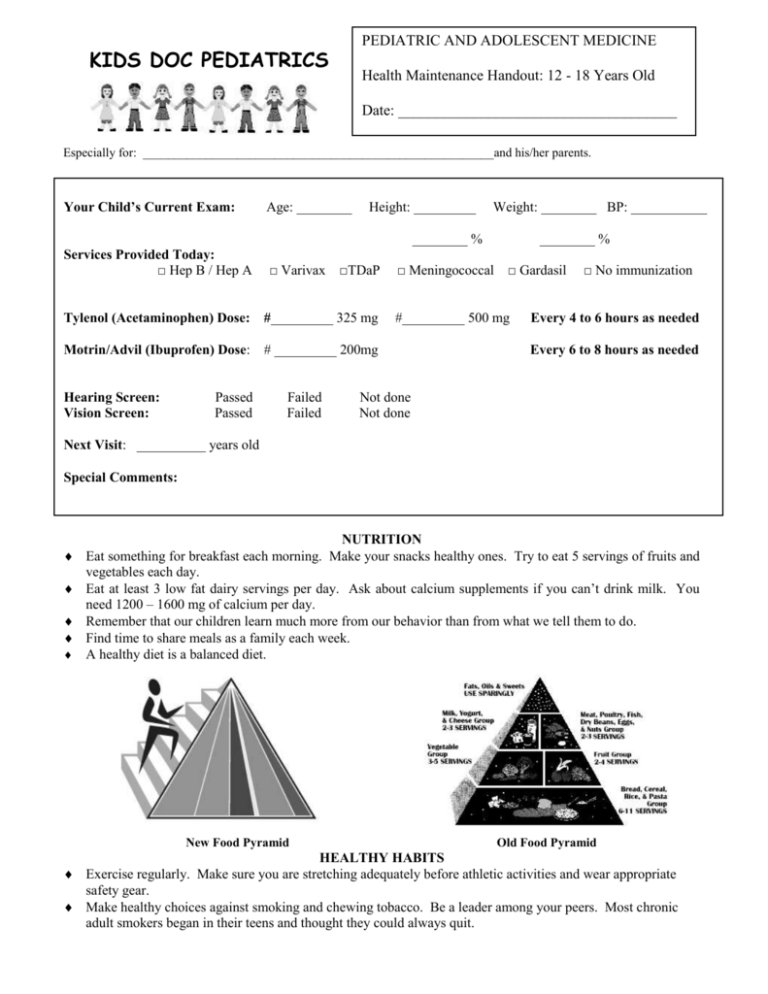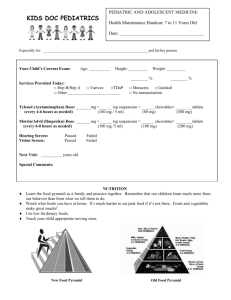12-18 Years - Kids Doc Pediatrics
advertisement

KIDS DOC PEDIATRICS PEDIATRIC AND ADOLESCENT MEDICINE Health Maintenance Handout: 12 - 18 Years Old Date: _____________________________________ Especially for: ________________________________________________________and his/her parents. Your Child’s Current Exam: Age: ________ Height: _________ Weight: ________ BP: ___________ ________ % Services Provided Today: □ Hep B / Hep A □ Varivax □TDaP Tylenol (Acetaminophen) Dose: #_________ 325 mg □ Meningococcal □ Gardasil #_________ 500 mg Motrin/Advil (Ibuprofen) Dose: # _________ 200mg Hearing Screen: Vision Screen: Passed Passed Failed Failed ________ % □ No immunization Every 4 to 6 hours as needed Every 6 to 8 hours as needed Not done Not done Next Visit: __________ years old Special Comments: NUTRITION Eat something for breakfast each morning. Make your snacks healthy ones. Try to eat 5 servings of fruits and vegetables each day. Eat at least 3 low fat dairy servings per day. Ask about calcium supplements if you can’t drink milk. You need 1200 – 1600 mg of calcium per day. Remember that our children learn much more from our behavior than from what we tell them to do. Find time to share meals as a family each week. A healthy diet is a balanced diet. New Food Pyramid Old Food Pyramid HEALTHY HABITS Exercise regularly. Make sure you are stretching adequately before athletic activities and wear appropriate safety gear. Make healthy choices against smoking and chewing tobacco. Be a leader among your peers. Most chronic adult smokers began in their teens and thought they could always quit. Practice regular self-examination of breasts and testicles monthly and notify your physician of any abnormalities or concerns. Don’t skimp on sleep. See your dentists every 6 months. Floss and brush regularly. SAFETY Wear a seat belt in the car. Don’t ride with someone who has been drinking. Parents should set good examples for their children. Wear a helmet when you bike, roller skate, or skateboard Learn how to swim. Never swim alone. Don’t combine swimming, boating, and alcohol. Guns are dangerous. Every 2 hours a child is killed by a gun in the U.S. If you have a gun in the home we encourage you place it in a safe place (locked and stored separately from the ammunition). Sunscreen! (SPF of 15 or above). BEHAVIOR/DEVELOPMENT Try out different types of sports, jobs, hobbies, and clubs. Your experience with a variety of activities and people energizes you and makes you a more interesting person. If someone you know has discussed suicide or has violent intentions, be sure to tell someone who can help. Make rules for yourself ahead of time about lifestyle issues (alcohol, sex, drugs, smoking) and stick to them. Talk with your parents about these. Having sexual curiosity is normal. Learn ways to say NO to sex. Abstinence is the only certain way of not becoming pregnant or contracting sexually transmitted diseases. If you need information about sex, sexually transmitted diseases, contraception you should talk to your parents, trusted adult, or doctor. Feel free to ask questions confidentially about these issues in the office or call us on the telephone. At this time in your life you are becoming more responsible for your own healthcare. Never hesitate to call us with questions or concerns. Prepare your child for the changes that will occur during puberty. FUTURE VISITS We encourage adolescents to begin assuming responsibility for their health. We will often perform part of the interview and examination with the parents out of the exam room. It is most helpful if we know about your concerns in advance. We maintain confidentiality regarding our discussions with adolescent patients. We will inform parents if an adolescent is posing a threat to him/herself or someone else. We encourage you to maintain open communication with your adolescent. SUGGESTED READING Your Ten to Fourteen Year Old, Louise Bates Ames, PhD Raising a Thoughtful Teenager, A Book of Answers and Values for Parents, Kamin, Ben Get Out Of My Life, But First Could Drive Me And Cheryl To The Mall?, Anthony E. Wall, PhD Ties That Stress, David Elkin, MD You and Your Adolescent, Laurence Steinberg, PhD and Ann Levine Raising a Child Conservatively in a Sexually Permissive World, Sol Gordon, PhD and Judith Gordon, MSW How To Talk So Kids Will Listen and Listen So Kids Will Talk, Adele Farber and Elaine Mazlish Altered Love, Mothers and Daughters During Adolescence, Terri Apter Son, A Mother’s Manual, Elyse Zorn Karlin The Family Crucible, Augustus Y. Napier, PhD and Carl Whitaker, M.D. Stop Struggling With Your Teens, Evonne Weinhaus and Karen Freidman Raising Good Children, Thomas LickonaThe Shelter of Each Other, Mary Pipher, PhD Surviving an Eating Disorder, Strategies for Family and Friends, Siegel, Brisnan, and Weinshel To parents: listen…really listen to your teen. To teens: if you want your parents to trust you, be responsible. Mutual respect is the key to a good relationship


